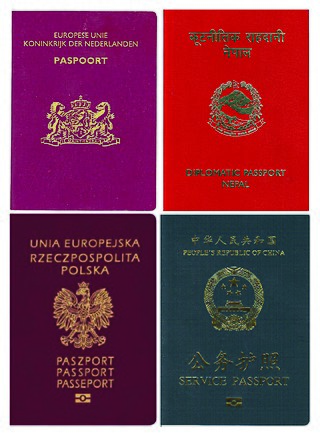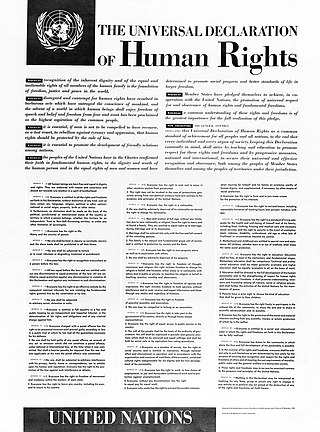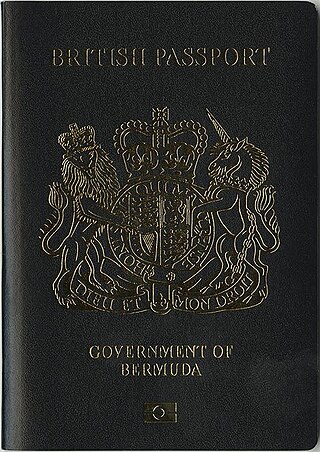
A passport is an official travel document issued by a government that certifies a person's identity and nationality for international travel. A passport allows its bearer to enter and temporarily reside in a foreign country, access local aid and protection, and obtain consular assistance from their government. In addition to facilitating travel, passports are a key mechanism for border security and regulating migration; they may also serve as official identification for various domestic purposes.

The British Overseas Territories (BOTs) are the fourteen territories with a constitutional and historical link with the United Kingdom that, while not forming part of the United Kingdom itself, are part of its sovereign territory. The permanently inhabited territories are delegated varying degrees of internal self-governance, with the United Kingdom retaining responsibility for defence, foreign relations, and internal security, and ultimate responsibility for governance. Three of the territories are chiefly or only inhabited by military or scientific personnel, the rest hosting significant civilian populations. All fourteen have the British monarch as head of state. These UK government responsibilities are assigned to various departments of the Foreign, Commonwealth and Development Office and are subject to change.

The term "British subject" has several different meanings depending on the time period. Before 1949, it referred to almost all subjects of the British Empire. Between 1949 and 1983, the term was synonymous with Commonwealth citizen. Currently, it refers to people possessing a class of British nationality largely granted under limited circumstances to those connected with Ireland or British India born before 1949. Individuals with this nationality are British nationals and Commonwealth citizens, but not British citizens.
Right of abode in Hong Kong entitles a person to live and work in the territory without any restrictions or conditions of stay. Someone who has that right is a Hong Kong permanent resident. Foreign nationals may acquire the right of abode after meeting a seven-year residency requirement and are given most rights usually associated with citizenship, including the right to vote in regional elections. However, they are not entitled to hold territorial passports or stand for office in some Legislative Council constituencies, unless they also naturalise as Chinese citizens.

The British Overseas Territories Act 2002 (c.8) is an Act of the Parliament of the United Kingdom which superseded parts of the British Nationality Act 1981. It makes legal provision for the renaming of the British Dependent Territories as British Overseas Territories, and the renaming of associated citizenship.

The British Nationality Act 1981 (c. 61) is an act of the Parliament of the United Kingdom concerning British nationality since 1 January 1983.

British National (Overseas), abbreviated as BN(O), is a class of British nationality associated with the former colony of Hong Kong. The status was acquired through voluntary registration by individuals with a connection to the territory who had been British Dependent Territories citizens (BDTCs) before the handover to China in 1997. Registration for BN(O) status was limited to the 10-year period preceding the transfer as a transitional arrangement for former BDTCs; current residents cannot newly acquire this nationality.

A British Overseas citizen (BOC) is a holder of a residual class of British nationality, largely held by people connected with former British colonies who do not have close ties to the United Kingdom or its overseas territories. Individuals with this form of nationality are British nationals and Commonwealth citizens, but not British citizens. BOCs are subject to immigration control when entering the United Kingdom and do not have the automatic right of abode there or in any British overseas territory.
The right of abode is an individual's freedom from immigration control in a particular country. A person who has the right of abode in a country does not need permission from the government to enter the country and can live and work there without restriction, and is immune from removal and deportation.

Belonger status is a legal classification normally associated with British Overseas Territories. It refers to people who have close ties to a specific territory, normally by birth or ancestry. The requirements for belonger status, and the rights that it confers, vary from territory to territory.

British nationality law as it pertains to Hong Kong has changed over time since it became a British colony in 1842. Hongkongers were given various nationality statuses, such as British subjects, Citizen of the United Kingdom and Colonies, British Dependent Territories Citizen and British Nationals (Overseas).

This article concerns the history of British nationality law.

A British Overseas Territories citizen (BOTC), formerly called British Dependent Territories citizen (BDTC), is a member of a class of British nationality granted to people connected with one or more of the populated British Overseas Territories, other than the Falkland Islands or Gibraltar.

A British protected person (BPP) is a member of a class of British nationality associated with former protectorates, protected states, and territorial mandates and trusts under British control. Individuals with this nationality are British nationals, but are neither British nor Commonwealth citizens. Nationals of this class are subject to immigration controls when entering the United Kingdom and do not have the automatic right of abode there or any other country.

The right of abode (ROA) is an immigration status in the United Kingdom that gives a person the unrestricted right to enter and live in the UK. It was introduced by the Immigration Act 1971 which went into effect on 1 January 1973. This status is held by British citizens, certain British subjects, as well as certain Commonwealth citizens with specific connections to the UK before 1983. Since 1983, it is not possible for a person to acquire this status without being a British citizen.

In practice, basic human rights in the British Virgin Islands (BVI) appear to be respected. Reports of repression of freedom of speech, interference with democracy or the rule of law, and arbitrary arrest and torture are generally non-existent. The BVI have been described as "generally free of human rights abuses".

The Gibraltar variant British passport is a British passport issued to British Citizens and British Overseas Territory Citizens who work or live in Gibraltar. Having Gibraltarian status alone, without being resident in Gibraltar, is insufficient to obtain a Gibraltar Passport. Gibraltar passports are issued by the Passport Office of the Gibraltar Civil Status and Registration Office. Since 2005, passports issued in Gibraltar have been biometric.

The primary law governing nationality in the United Kingdom is the British Nationality Act 1981, which came into force on 1 January 1983. Regulations apply to the British Islands, which include the UK itself and the Crown dependencies ; and the 14 British Overseas Territories.

The British National (Overseas) passport, commonly referred to as the BN(O) passport, is a British passport for people with British National (Overseas) status. BN(O) status was created in 1987 after the enactment of Hong Kong Act 1985, whose holders are permanent residents of Hong Kong who were British Overseas Territories citizens until 30 June 1997 and had registered as BN(O)s.

British passports previously issued by the Department of Immigration of the Government of the British Overseas Territory of Bermuda on behalf of His Majesty's Passport Office of the Government of the United Kingdom, differed from those issued in the United Kingdom and elsewhere in having "Government of Bermuda" added to the outside of the front cover, and the request from His Britannic Majesty's Secretary of State in the Name of His Majesty The King, which is printed on the inside of the cover of passports issued by the UK Government, replaced with the same request from the Governor of Bermuda as the competent authority in this behalf, in the Name of His Majesty The King.








